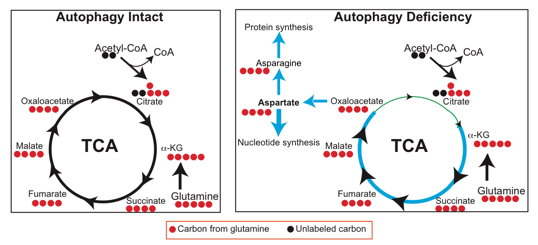Research Overview
Research in the Guo Lab focuses on the field of cancer metabolism, with an emphasis on how autophagy is involved in modulating cancer metabolism to maintain Kras-driven lung tumor growth and metastasis. Ras-driven lung cancers are among the most lethal, and unfortunately, efforts to develop drugs that target Ras directly have so far been unsuccessful. It has been known for decades that the metabolism of cancer cells is distinct from that of normal cells, suggesting that targeting metabolism is a valuable approach to cancer therapy.
Autophagy is a process that cell eats itself to maintain cellular metabolism during metabolic stress. Previous research from Dr. Guo and others demonstrated that autophagy is required to maintain functional mitochondria to support Kras-driven Non-small cell lung cancer (NSCLC), which suggests that targeting autophagy or mitochondria could be potential therapy for Ras-driven cancer. Dr. Guo’s research program will further understand the mechanisms by which autophagy regulates cancer metabolism in Kras-driven lung cancers and enable the evaluation of the potential for autophagy inhibition to enhance cancer therapy. Additionally, tumor metastasis is the major cause of mortality for NSCLC patients, Dr. Guo will examine if autophagy is required to maintain metabolism necessary for NSCLC metastasis. Finally, Dr. Guo will also identify novel metabolic vulnerabities in Kras-driven lung cancer and targeting them to improve current chemotherapies.

Combination of genetically engineered mouse models, the state-of-the-art metabolomic and lipidomic analysis, and in vivo isotope tracing studies will be utilized to achieve these goals. Knowledge gained from this research program will not only increase our understanding of the regulation of autophagy in Kras-driven lung cancer metabolism, but may uncover novel drug targets for lung cancer.

